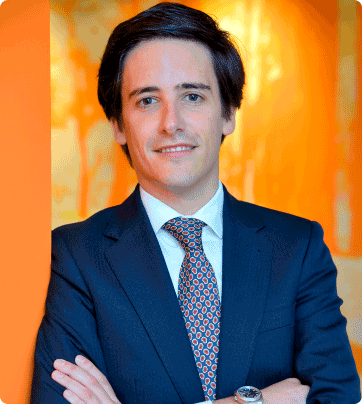The first ten years of Lar España’s life have been strongly conditioned by two major macroeconomic events. On the one hand, the global financial crisis of 2008, very virulent in the real estate sector, which explains why no real estate company was listed on the Continuous Market from 2007 until we took the plunge on March 5, 2014. On the other side, the European Central Bank’s policy to contain inflation resulting from the war in Ukraine, which resulted in the sharpest interest rate hike in the last century.
If financial soundness is an obligatory requirement for any company with a vocation for permanence, for a socimi such as Lar España, controlling and managing its level of indebtedness and the recurrence of income has been its first and most important corporate mandate. We have developed what has probably been the most rigorous and cautious financial policy in the entire real estate sector. It has kept us with a low level of indebtedness, always below 50% of the valuation of the assets, and with interest rates that have always been well below the sector average at all times.
Lar España was the first socimi to be listed on the Continuous Market. It was also a pioneer in issuing corporate bonds to finance itself. It did so in February 2015, in what was the first euro-denominated covered bond issued by a REIT listed on the Irish stock exchange’s main stock market. The issue, worth €140 million, was placed primarily with foreign institutional investors. The structure of the transaction allowed Lar España great flexibility to develop its investment and business plan, with additional leverage capacity. For the market, it was a milestone that confirmed the quality of the corporate asset portfolio, set the path for future issues and boosted its medium-term investment plan.
Before the maturity of this first issue, our company was able to anticipate the uncertainties that were beginning to affect geopolitics and the macroeconomy. First the pandemic, then the supply crisis, the sudden Russian invasion of Ukraine and the risk of energy shortages led to an abrupt rise in interest rates, designed to cool the economy and contain inflation that was threatening to spiral out of control. We are not talking about particularly high interest rates, but the hike was too abrupt and only served to contain inflation in fits and starts until almost December 2023.
In that context, the refinancing of the entire company’s debt has likely been the most praised measure by investors in the last two and a half years. Markets showed widespread caution towards the rising cost of financing for companies needing to invest or whose debt structures were nearing maturity. In these two cases, Lar España is worth mentioning because in 2021, it was one of the first listed companies to completely restructure its debt by issuing two senior green bonds with maturities in 2026 and 2028, carrying a fixed interest rate of less than 1.8%. Furthermore, in 2023, our company partially repurchased them for a total nominal amount of 119 million euros and a final total price of 98 million euros, equivalent to a discount of 18%. In a context of sectorial uncertainty, the repurchase has allowed for optimizing surplus cash, reducing indebtedness, and generating a positive impact of over 20 million euros on the results of the past fiscal year.
In parallel, the company has also prioritized maximizing the profitability for all shareholders through a dividend policy that, since our first year of activity, has distributed over 325 million euros. However, we haven’t only worked from the dividend perspective. Since 2019, we have repurchased 13.4% of the company’s shares and amortized them, so the remaining shares’ profitability has increased in the same proportion.
While adequate financing is an evident requirement, compliance with ESG criteria is equally essential. Few things have as much financial impact on a company as transparency, accessibility, and non-financial information policy, as well as principles of corporate governance and the establishment and functioning of the Board. Transparent governance, with recognized and open independent directors to various stakeholder groups, is a prerequisite to advance in environmental and social responsibility. In other words, in the ESG equation, the “g” of governance is the true key to achieving tangible and real results.
The breadth of issues, the need to prioritize, and having a broad perspective have increased the importance of having independent directors capable of ensuring a multidisciplinary view of the business and the social and environmental implications of the activity. Moreover, if the Board’s oversight and its committees ensure that efficiency, shareholders will feel doubly attended to by the organization. Good ESG will allow for more and better sustainable initiatives, which will positively impact financing conditions and range.
I believe that this strengthened governance in both financial and non-financial aspects is particularly necessary in listed real estate companies. A majority of independent directors, necessary checks on executive decisions, or the commitment and depth of committees on audit, appointments, remuneration, or sustainability are mandatory merits. Transparency and symmetry of financial information, depth in the road show policy, or accessibility and updating of the corporate website are also essential. Every aspect adds up, and it’s not a coincidence that proxy advisors ISS and Glass Lewis have been voting in favor of all agenda items at Lar España’s Shareholders’ Meetings for eight consecutive years.
In the long run, strengthening financial solidity will help maintain the attention of various stakeholders on the company. From institutional investors to retail investors, tenants, or end customers, it’s possible to complete a virtuous circle where a generous dividend policy is also advisable. When these requirements are met, it becomes easier to modernize portfolios without increasing debt or resorting to capital increases. Highly qualified investments can be made while actively implementing a rotation policy for less strategic assets and intensifying innovation and digitization policies based on profitability criteria. Over the past ten years, Lar España’s financial solidity has continuously grown. In the next ten years, our goal is to consolidate and reinforce it in the same proportion.

